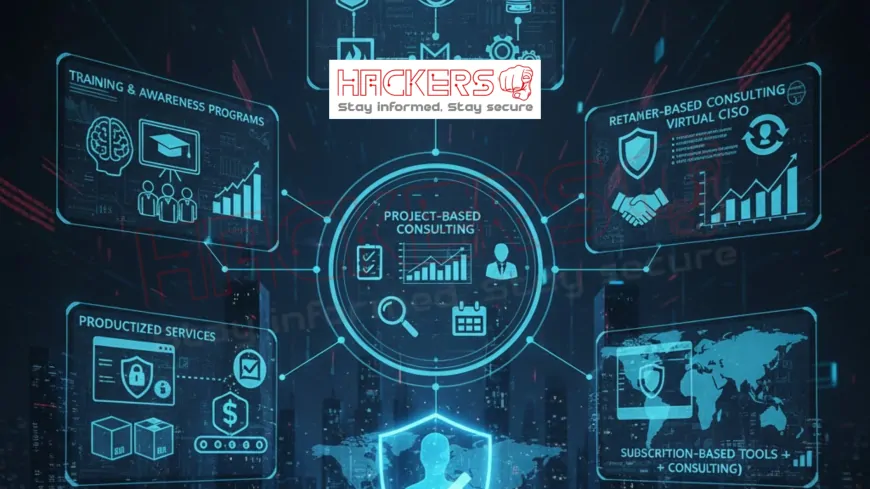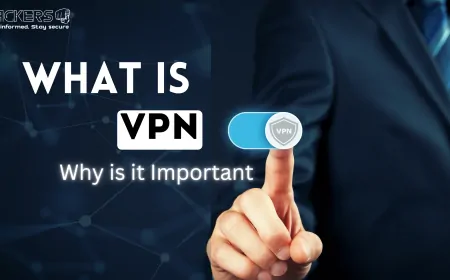What Business Models Can Work in the Cybersecurity Consulting Space?
In today's digital age, businesses face constant threats from cyberattacks, data breaches, and evolving regulations. Cybersecurity consulting has become a critical service, helping organizations protect their assets and maintain trust with their customers. But how do cybersecurity consultants structure their businesses to succeed in this dynamic field? Whether you're an entrepreneur looking to start a consultancy or a business owner exploring options, understanding the right business model is key to thriving in this industry. This blog explores various business models that work in the cybersecurity consulting space, breaking them down in a way that's easy to grasp, even for beginners. We'll dive into the pros, cons, and practical applications of each model to help you make informed decisions.

Table of Contents
- Why Cybersecurity Consulting Matters
- Key Business Models in Cybersecurity Consulting
- Comparing Business Models
- Choosing the Right Model for Your Business
- Conclusion
- Frequently Asked Questions
Why Cybersecurity Consulting Matters
Cybersecurity is no longer optional. With high-profile data breaches making headlines and regulations like GDPR and CCPA imposing hefty fines, businesses need expert guidance to stay secure and compliant. Cybersecurity consultants assess risks, implement solutions, and train teams to prevent attacks. The demand for these services is skyrocketing, with the global cybersecurity market expected to grow significantly in the coming years. This creates a unique opportunity for consultants to build sustainable businesses using various models tailored to different client needs and market demands.
Key Business Models in Cybersecurity Consulting
Below, we explore the most common business models in cybersecurity consulting, each with its own strengths and challenges.
Hourly Consulting
In the hourly consulting model, clients pay for the time spent on services like risk assessments, penetration testing, or incident response. This model is straightforward and ideal for small businesses or one-off projects.
- Pros: Flexible for clients, easy to track hours, good for short-term projects.
- Cons: Income can be inconsistent, clients may question time spent, scaling is limited by hours available.
- Best for: Freelancers or small firms serving small to medium-sized businesses.
Retainer-Based Consulting
In this model, clients pay a fixed monthly fee for ongoing services, such as monitoring, compliance support, or regular security audits. Retainers ensure steady income and long-term client relationships.
- Pros: Predictable revenue, builds trust with clients, encourages proactive security measures.
- Cons: Requires consistent service delivery, may limit new client acquisition if capacity is full.
- Best for: Mid-sized firms with established clients needing continuous support.
Project-Based Consulting
Project-based consulting involves charging a flat fee for a specific deliverable, like implementing a security framework or conducting a full network audit. This model suits well-defined, time-bound projects.
- Pros: Clear scope and deliverables, higher profit margins on efficient projects, appealing to clients with specific needs.
- Cons: Scope creep can erode profits, requires precise estimation skills.
- Best for: Firms with expertise in niche areas like compliance or incident response.
Managed Security Service Provider (MSSP)
MSSPs offer outsourced security services, such as 24/7 monitoring, threat detection, and incident response. Clients pay a subscription fee for comprehensive protection.
- Pros: Scalable, recurring revenue, meets growing demand for outsourced security.
- Cons: High initial investment in tools and infrastructure, requires 24/7 operations.
- Best for: Larger firms with the resources to invest in technology and staff.
Value-Based Consulting
In value-based consulting, fees are tied to the value delivered, such as preventing a costly breach or ensuring compliance to avoid fines. This model requires deep trust and clear metrics.
- Pros: High earning potential, aligns with client outcomes, differentiates you in the market.
- Cons: Hard to quantify value, requires strong negotiation skills, not suitable for all clients.
- Best for: Experienced consultants working with large enterprises.
Product-Integrated Consulting
This model combines consulting with selling or implementing specific cybersecurity products, like firewalls or endpoint protection software. Consultants earn revenue from both services and product margins.
- Pros: Diversified income streams, leverages vendor partnerships, appeals to clients wanting turnkey solutions.
- Cons: Potential bias toward specific products, requires product expertise.
- Best for: Firms with strong vendor relationships and technical expertise.
Comparing Business Models
Each business model has unique advantages and challenges. The table below summarizes key factors to help you compare them.
| Business Model | Revenue Predictability | Scalability | Client Type | Initial Investment |
|---|---|---|---|---|
| Hourly Consulting | Low | Limited | Small Businesses | Low |
| Retainer-Based | High | Moderate | Mid-Sized Businesses | Moderate |
| Project-Based | Moderate | Moderate | All Sizes | Low |
| MSSP | High | High | Large Enterprises | High |
| Value-Based | Variable | Moderate | Large Enterprises | Low |
| Product-Integrated | Moderate | High | All Sizes | Moderate |
Choosing the Right Model for Your Business
Selecting the best business model depends on your expertise, resources, and target market. Here are some factors to consider:
- Expertise: If you're a solo consultant with broad skills, hourly or project-based models may be easier to start with. Specialized expertise suits value-based or product-integrated models.
- Resources: MSSPs require significant investment in tools and staff, while hourly consulting needs minimal upfront costs.
- Client Needs: Small businesses prefer affordable, flexible options like hourly or project-based consulting. Large enterprises may need MSSP or value-based services.
- Growth Goals: Retainers and MSSPs offer scalability and predictable revenue, ideal for firms aiming to grow.
Many successful consultancies combine models, such as offering retainers for ongoing support and project-based fees for specific tasks. Experimenting with hybrid models can help you find the right balance.
Conclusion
The cybersecurity consulting space offers diverse opportunities for building a successful business. From hourly consulting for small businesses to managed security services for large enterprises, each model has unique strengths. By understanding your expertise, resources, and client needs, you can choose or combine models to create a sustainable and profitable consultancy. The key is to stay adaptable, focus on delivering value, and keep up with the evolving cybersecurity landscape. Whether you're just starting out or looking to scale, there's a business model that can work for you in this high-demand industry.
Frequently Asked Questions
What is cybersecurity consulting?
Cybersecurity consulting involves helping businesses protect their digital assets by assessing risks, implementing security measures, and ensuring compliance with regulations.
Why is there a demand for cybersecurity consulting?
Rising cyberattacks, data breaches, and strict regulations like GDPR drive the need for expert guidance to secure businesses.
Who can start a cybersecurity consulting business?
Anyone with expertise in cybersecurity, such as risk assessment or penetration testing, can start a consultancy, from freelancers to large firms.
What is the hourly consulting model?
Clients pay for the time spent on services like audits or incident response, typically billed per hour.
Is hourly consulting profitable?
It can be profitable for small projects but may not scale well due to limited hours and inconsistent income.
What is a retainer-based model?
Clients pay a fixed monthly fee for ongoing services like monitoring or compliance support, ensuring steady revenue.
Who benefits from retainer-based consulting?
Mid-sized businesses needing continuous security support benefit most, as do consultants seeking predictable income.
What is project-based consulting?
Consultants charge a flat fee for a specific project, like implementing a security framework or conducting an audit.
What are the risks of project-based consulting?
Scope creep, where clients request additional work without extra pay, can reduce profitability if not managed well.
What is an MSSP?
A Managed Security Service Provider offers outsourced security services like 24/7 monitoring and threat detection for a subscription fee.
Is starting an MSSP expensive?
Yes, it requires significant investment in tools, infrastructure, and staff to provide round-the-clock services.
What is value-based consulting?
Fees are based on the value delivered, such as preventing a costly breach, rather than hours worked.
Is value-based consulting common?
It's less common but growing, especially among experienced consultants working with large enterprises.
What is product-integrated consulting?
This model combines consulting with selling or implementing cybersecurity products, like firewalls or antivirus software.
Can small businesses afford cybersecurity consulting?
Yes, models like hourly or project-based consulting are affordable for small businesses with limited budgets.
How do I choose the right business model?
Consider your expertise, resources, target clients, and growth goals to select or combine models that suit your business.
Can I combine multiple business models?
Yes, many consultancies use hybrid models, like offering retainers for ongoing work and project-based fees for specific tasks.
How do I attract clients in cybersecurity consulting?
Showcase expertise through case studies, network with businesses, and leverage partnerships with cybersecurity vendors.
What skills are needed for cybersecurity consulting?
Skills in risk assessment, penetration testing, compliance, and communication are essential, along with staying updated on threats.
How can I stay competitive in this industry?
Continuously learn about new threats, build strong client relationships, and offer flexible, value-driven services.
What's Your Reaction?










































































